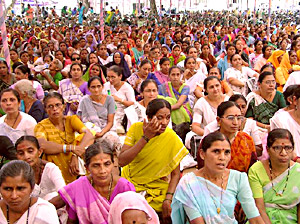 Mehtaji Durgaram Manchharam, Dadoba Panderung Tarkhad and a few others founded Manav Dharma Sabha on 22 June 1844 in Surat. This Sabha was one of the earliest socio-religious reform movements in Gujarat and British India. The goals of the Manav Dharma Sabha were to expose the deceitful arts present in Christian, Muslim and Hindu religions. Although the Manav Dharma Sabha had a very short life span and ceased to exist as Dadoba left for Bombay in 1846 and Durgaram left for Rajkot in 1852, it acted as a secret society and is believed that the revelation of its survival compounded to its downfall.
Mehtaji Durgaram Manchharam, Dadoba Panderung Tarkhad and a few others founded Manav Dharma Sabha on 22 June 1844 in Surat. This Sabha was one of the earliest socio-religious reform movements in Gujarat and British India. The goals of the Manav Dharma Sabha were to expose the deceitful arts present in Christian, Muslim and Hindu religions. Although the Manav Dharma Sabha had a very short life span and ceased to exist as Dadoba left for Bombay in 1846 and Durgaram left for Rajkot in 1852, it acted as a secret society and is believed that the revelation of its survival compounded to its downfall.
The British resided in Surat since the second decade of the seventeenth century; however, it was not until the 1840s that tensions arose through the introduction of western education and missionary activities. Commencing in 1820, the Bombay government started a school in Surat and another in Broach. Within a decade other schools were added all across the cities of Gujarat. Their program comprised of English texts and translated them into the vernaculars. The teaching staffs arrived from local communities, but were often educated in Bombay, as was illustrated by the life and career of Mehtaji Durgaram Manchharam (1809-78). He was a Nagar Brahman, born in Surat and trained in Bombay. In 1830 he achieved the post of a headmaster in a Government School in Surat, an institution founded in 1826. Four years later when the Surat English School was opened, Durgaram took the position of headmaster.
Mehtaji Durgaram Manchharam became a leading figure among the small group of cultured Gujaratis who came together in the 1830s as critics of contemporary society. The prominent participants in this group were Dinmani Shankar, Dadoba Panderung Tarkhad, Dalpatram Bhagubai and Damodar Das. Advocates of cultural and religious amend were incited to action by the conversion of a Parsi student, Nasarwanji Manakji, and the consequential uproar amidst the Parsi and Hindu communities.
The Manav Dharma Sabha had only a short career as an active organization. It began to shatter in 1846 when Dadoba Panderung went back to Bombay, and almost stopped to function in 1852 when Durgaram Manchharam left for Rajkot. Although the life of Manav Dharma Sabha was severely limited, it was directly linked to later developments in Maharashtra and Gujarat as its members carried with them the ideals of the movement and became leaders in parallel organizations.
The Manav Dharma Sabha appealed to the small, sophisticated elite of Surat and began as a reaction to Christian conversions. For a short period this society appeared to be the groundwork of an acculturative socio-religious movement with a philosophy that spoke of the need for noteworthy change. Its ideas and programme however did not have the ability to generate strong commitment on the part of its followers, commitment of satisfactory strength to directly confront the leadership and domination of recognized religion. In spite of the short life span of Manav Dharma Sabha, the ideas that came out from the discussions were passed on to two direct descendants, one of which was the Paramahansa Mandali of Maharashtra. The absence of the Manav Dharma Sabha did not wash away its teachings, because they were deeply instilled in the minds of the participants.



















